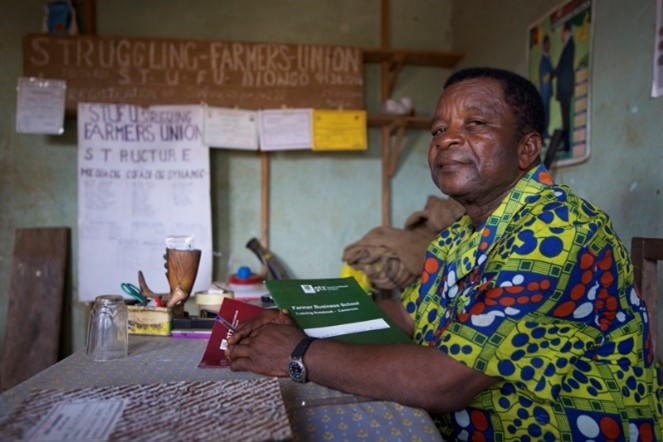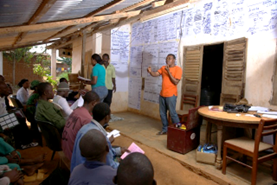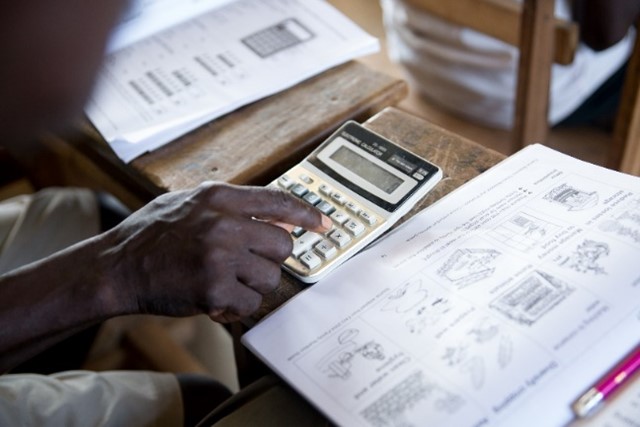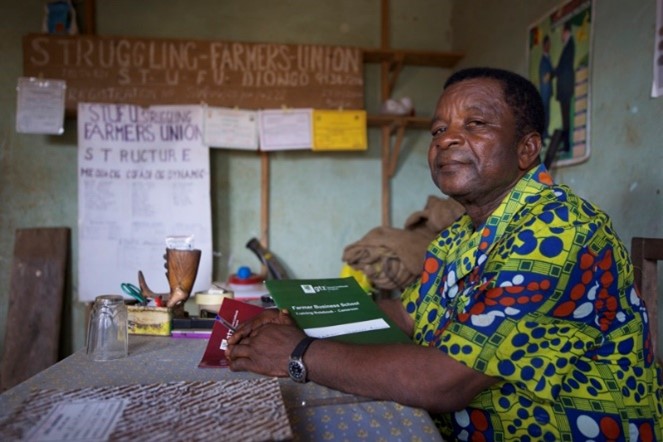
Building entrepreneurship of agricultural MSMEs: The Farmer Business School
Overview
Two thirds of Africans depend on agriculture for their livelihood and one third of African GDP is generated by agriculture. Rural areas are home to 70% of Africa’s poor. Rural-urban migration, especially of youth, is accelerating. Food imports to Africa cost 35 billion USD per year and could triple by 2025 should production not increase significantly.
Micro, small and medium enterprises (MSME) agri-businesses operate in national, regional and international value chains. They provide income, jobs and feed the growing population of African cities. However, entrepreneurship remains marginalised.
The Agri-Business Facility for Africa (ABF, 01/2020 to 05/2023) is a regional programme implemented by GIZ and funded by the German Federal Ministry for Economic Cooperation and Development (BMZ). ABF provides advisory and adaptable tools to implement the farmer business school (FBS) developed in 2010 by GIZ, the programme SSAB (precursor of ABF) and African partners. Funding was provided by BMZ, the Bill and Melinda Gates Foundation and members of World Cocoa Foundation.
The principles underlying FBS are:
- Personal freedom and objectivity for decision-making and investment
- Building professional ethics and behaviour in entrepreneurs
- Balanced nutrition for healthier families and the ability of adults to work
- Higher efficiency of production, better quality of products, and compliance with standards
- Professional producer organisation for access to inputs, services and markets
FBS is currently adopted and rolled out by public and private sector partners in 24 countries in various value chains (see map). Capacity building and knowledge dissemination through face-to-face training is complemented by virtual, self-tutored learning and the FBSInnova smartphone app to support blended learning approaches.
Good Practice Approach
FBS training strengthens agricultural smallholders’ business skills for increased income from diversified production. FBS leverages diverse groups of learners, including women and youth, to achieve more sustainable impacts in communities, using interactive role play, group exercises with economic tools, discussion and change processes. Participants receive FBS notebooks for use during and after training. Training covers:
- Planning and economics
- Healthy nutrition and farm management
- Investment decisions and strategies based on cost and benefit analysis
- Financial management, savings and credit
- Benefits from good quality produce and membership in producer organisations.

FBS is a federating approach. Large scale implementation is possible due to cooperation with and mobilisation of public and/or private stakeholders.
A special case of cooperation has been the co financing from Nigeria Incentive-based Risk-sharing System for Agricultural Lending (NIRSAL). Its support (2013-2016) helped to roll out FBS training to 29 900 cocoa producing MSMEs and to 5 500 rice, cotton and tomato producing MSMEs.
Key Results
- Over 480 000 cocoa producers (29% women) in Côte d’Ivoire, Ghana, Cameroon, Nigeria and Togo participated in FBS trainings under Sustainable Smallholder Agri-Business (SSAB), ABF’s precursor project.
- Since 2012, 40 other development programmes, their partners, national organisations and two companies adapted FBS with support from SSAB and ABF (since 2020) for 39 value chains other than cocoa.
- About 1 500 000 smallholders (33% women) in 24 African countries have undergone FBS training.

- 50% of surveyed FBS graduates have savings at a bank or with their cooperative
- 41% qualified for agricultural loans
- 40% of trained groups registered or reactivated producer organisations
- 74% use FBS tools for planning, records and calculation of profits and losses
- Over 50% of FBS groups organise bulk sales and purchase of inputs
- 45% of the groups registered as a cooperative or association
- Income from food products reached over USD 1 800 USD in real terms in 2017 and compensates volatile cocoa prices.
- 71% of FBS graduates pay school fees for their children and 85% use additional income to improve family nutrition.
Lessons Learnt
Success Factors
Parties interested in introducing FBS can build on proven impacts, cost-effective standard tools, an Africa-wide network of practitioners and master trainers. The tool kit covers strategic clarification, economic and investment analysis, diversification, adult training, planning, M&E, budgeting and contracts. FBS is customised to specific agroecological conditions, technology and market opportunities while maintaining the didactics and tools for economic analysis and investment decisions.
There is a clear win-win for private companies promoting FBS as farm enterprises thrive and grow with better entrepreneurial skills. Agricultural processing and trading companies also see the case for diversification and its impact on the economics of agricultural producers.
Standardisation of learning methods, objectives, skills and quality standards has been a prerequisite for the scaling of the FBS approach to 24 countries.
Challenges / Barriers
The Covid-19 pandemic has limited face-to-face training. This has given momentum to remote and blended learning approaches which are embraced by ABF for further scaling.
Moving Forward
With the recent launch of the FBSInnova smartphone application, face-to-face training is complemented by the digital application of skills and tools. The app can be used in eight African countries.
ABF is soon to launch the Agri-Business e-Academy, self-paced e-learning on the atingi platform (www.atingi.org) which will complement face-to-face training disseminated and customised by ABF. This will allow learners to deepen and refresh their knowledge, pre-qualify for trainer certification or additional training offers. Knowledge tests, networking opportunities and a knowledge repository complement the experience.

Resource
Typical FBS scene (here from Cameroon) ... decentralized where the agricultural MSME are

Getting certificate ... sometimes for the first time ... here scene from Norther Nigeria

Calculating and planning before producing,

FBS training strengthens producer organization and “incubates” new ones

Diverisifcation and business skills: female entrepreneurs benefit from it


Contact details:
Deutsche Gesellschaft für Internationale Zusammenarbeit (GIZ) GmbH
Registered offices Bonn and Eschborn, Germany
Agri-Business Facility for Africa
65760 Eschborn, Germany
Dr. Annemarie Matthess, Head of Project
Veronika Kling, Deputy
www.giz.de | www.ssab.africa.net | www.A4SD.net


